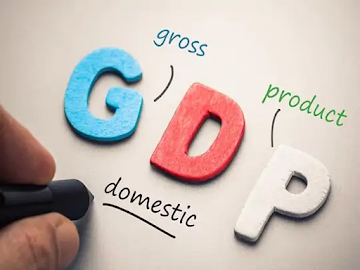Gross Domestic Product (GDP) is a useful tool for gauging a nation's economic success. It is the monetary value of all the products produced within a nation's borders over a certain time period, typically a year.
Consumption, investments, government spending, and net exports are the elements that make up GDP. Private expenditure on goods and services is known as consumption. Investment is the purchase of capital, such as machinery and equipment, for commercial purpose. Spending on the government covers both federal and state expenditures as well as transfer payments from initiatives like Social Security. Exports less imports are referred to as net exports.
Because it is a broad measure of economic activity, GDP is a crucial indicator of the health of the economy. GDP growth that is consistent indicates a thriving and healthy economy. When GDP declines, the economy is said to be contracting and in a recession.
GDP is also used to compare economies of various sizes or the performance of various nations through time. For instance, when their respective GDP figures are compared, it is simpler to compare a large country like the United States to a smaller country like Belgium. It is also possible to compare countries even if they don't use the same currency because GDP is expressed in money.
10 Surprising Factors That Affect GDP
Here are ten factors that can affect GDP:
1. Consumer spending affects GDP
One of the key elements in assessing an economy's health is consumer spending. Economic growth is fueled by consumer spending as businesses expand employment and increase production to keep up with demand.
Furthermore, consumer spending is obviously crucial to firms. A given company often performs better the more money customers spend there. Because of this, it is not unexpected that the majority of investors and companies pay close attention to data on consumer purchasing trends. When formulating forecasts, investors and businesses pay close attention to consumer spending information.
2. Interest rates
An economy's performance can be significantly impacted by interest rates. Lower interest rates boost spending and borrowing, which stimulates the economy. The cost of borrowing money increases as interest rates rise, impeding the expansion of the economy.
How does an increase in interest rates affect real GDP?
An increase in interest rates makes saving more appealing because the benefit is now greater. So, if people's salaries stay the same, saving in the economy will probably rise while consumption declines. An increase in interest rates drives up borrowing costs, which drives up investment costs. This deters companies from making investments, which lowers economic investment. The increased cost of borrowing will result in greater interest payments on the government debt, but we are unable to foresee what impact this would have on government spending. For this query, we will thus disregard it.
3. Government spending
Governments are frequently in charge of major expenditure and investment initiatives. Depending on the specific programmed used, these initiatives may have an impact on both short- and long-term growth.
A multiplier impact could be produced by the increased government spending. The unemployed will have more money to spend if government expenditure results in employment growth, which will boost aggregate demand even more. Government expenditure may result in a larger final gain in GDP than the initial injection in these cases of economic overcapacity.
4. Foreign trade
The volume of international trade has an impact on a nation's GDP as well. The difference between an economy's exports and imports is added to its GDP. Similar to this, when imports exceed exports, the difference is subtracted from GDP.
One of the crucial components of a nation's gross domestic product (GDP) formula is the trade balance. When there is a trade surplus, the total value of domestic producers' exports of goods and services exceeds the total value of imports of goods and services purchased by domestic consumers.
5. Tax policies
Government tax policies can have a big impact on GDP. Lower taxes can encourage businesses to hire more workers and invest in production, while higher taxes can have the opposite effect.
6. Technological advancement
Economic growth can be fueled by technological advancement. New technologies have the potential to boost productivity and open up new markets, resulting in more jobs and a greater GDP.
7. Employment rate
A vital indicator of the health of the economy is the unemployment rate. Low unemployment is a sign of a healthy economy, whereas high unemployment often results in slower economic growth and lower GDP.
8. Inflation
A vital indicator of the health of the economy is the unemployment rate. Low unemployment is a sign of a healthy economy, whereas high unemployment often results in slower economic growth and lower GDP.
The Relationship Between Inflation and GDP
However, excessive GDP growth is also risky since it almost certainly accompanies an increase in inflation, which depreciates our money (and future corporate profits), eroding stock market gains.
9. Natural resources
Oil, gas, and other natural resources can be a sizable source of revenue for nations with abundant supplies. The GDP could be significantly impacted by the selling of these resources.
10. Population growth
GDP may be impacted by population growth. Population growth results in more workers and more consumers, which can boost the economy. On the other hand, an ageing population may result in fewer consumers and workers, which would restrict economic growth.
For instance, a rise in the population in the United States will improve availability to labour, which will boost productivity and raise the output of commodities. The consequence will be a rise in the nation's output (as indicated by GDP)!













No comments:
Post a Comment